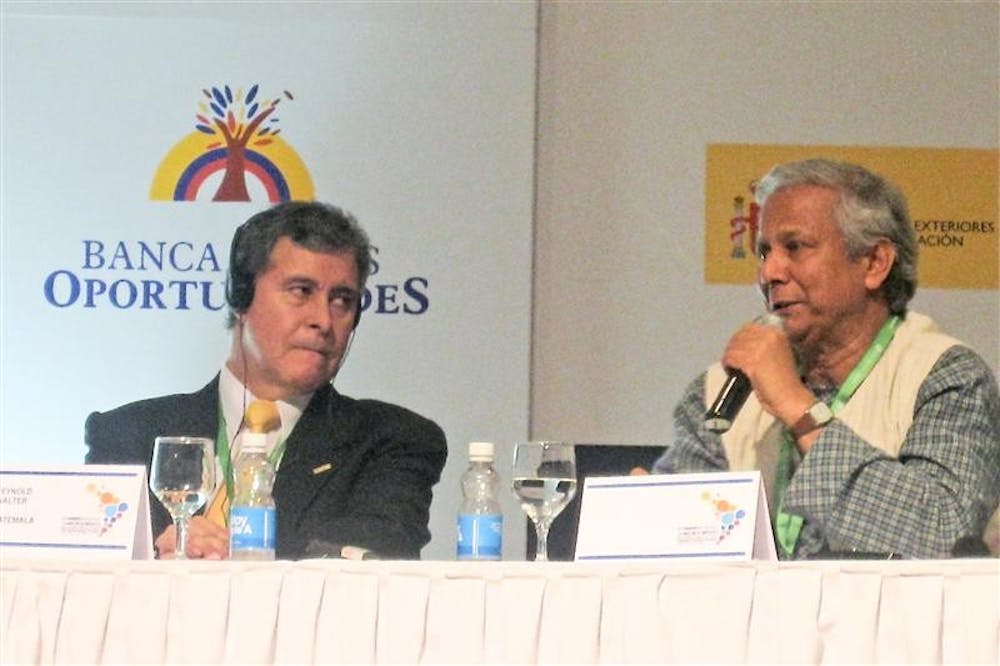CARTAGENA DE INDIAS, Colombia – “We can open a window of opportunity to alleviate poverty among women, men, young and old to set them free,” former Peruvian President Alejandro Toledo said of microfinance.
At the 12th annual Microcredit Summit Campaign for the Latin American-Caribbean Region in Cartagena de Indias, Colombia, leaders in microfinance gathered to discuss ways to ensure that the extreme poor receive financial and business services. They also talked about how to ensure that 100 million families rise above the $1 purchasing power parity, even amidst one of the worst financial crises of this century.
Aside from Toledo, other dignitaries in attendance included current Colombian President Alvaro Uribe, director of Grameen Bank Muhammad Yunus and countless other microcredit, microfinance and microenterprise professionals from Austria to Zambia. They have descended upon this Caribbean colonial town to talk shop and compare plans for the future.
Yunus, along with Grameen Bank, which he founded, won the Nobel Peace Prize in 2006 for his efforts to solve world poverty through microfinance. Yunus virtually founded the field of microfinance back in the late 1970s in Bangladesh.
Now, because of this revolution in credit extension, “more than 80 percent of Bangladeshis have access to financial services, a huge increase, unheard of in other developing countries,” Yunus said.
As of July 2007, Grameen had loaned $6.38 billion to more than 7.4 million borrowers around the world, including some in the United States.
“The challenge is finding a way to give the more than 1 billion people who still lack financial services in the world a helping hand especially as microfinance and microbusinessmen are being greatly affected by the world financial crisis,” said Reynold Walter, executive director of Fundacion de Asesoria Financiera a Instituciones de Desarrollo y Servicio Social in Guatemala.
Some of the recommendations discussed at the summit to increase the poor’s access to financial services include using technology to create cost-effective e-banking, creating a stock market that trades only in microfinance and microenterprise organizations, and creating a legal framework for the microfinance industry.
“Microfinance doesn’t have a home or regulatory framework to allow for sustainability,” Yunus said. “Taking savings as a microfinance institution is an illegal activity in many countries, and these antiquated laws must be changed.”
Speakers cited the ongoing worldwide financial crisis as reason to take drastic action soon.
“The financial crisis has shown the world that microfinance is how the world should do banking,” said Elisabeth Rhyne, managing director of the Center for Financial Inclusion at ACCION USA, an American microfinance firm. “(Microfinance) has a way to change how private industry does business and how to work toward full financial inclusion. In short, microfinance shows how business can have a soul.”
The summit also had sessions on how to improve transparency in interest rate pricing, integration of microfinance with health care, use of technology for greater efficiency and how microfinance institutions can have a positive impact on gender equality and the environment.
In addition, the summit had its own social commentary on the current state of the business world.
“Business should just cover costs and not have the goal of making a profit. This is the basis of selflessness,” Yunus said. “Profits should not be a consideration, only getting people out of poverty.”
In addition, Rhyne said, “To have a soul, companies need to understand low-income people and make a patient, long-term commitment to servicing them. There needs to be an enlargement and elevation of social goals within the business process.”
As the conference came to a close Wednesday, Toledo reminded the delegates that “to alleviate the poverty in the world is the central reason why we are here today and the reason why MFIs (microfinance institutions) exist. Never forget that.”
Microcredit leaders convene to fight extreme poverty

Get stories like this in your inbox
Subscribe



